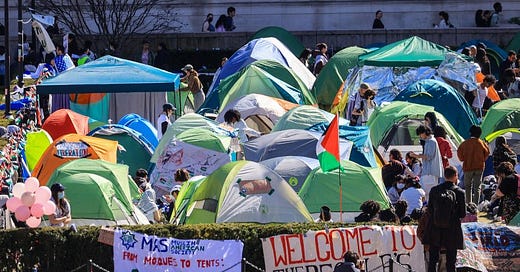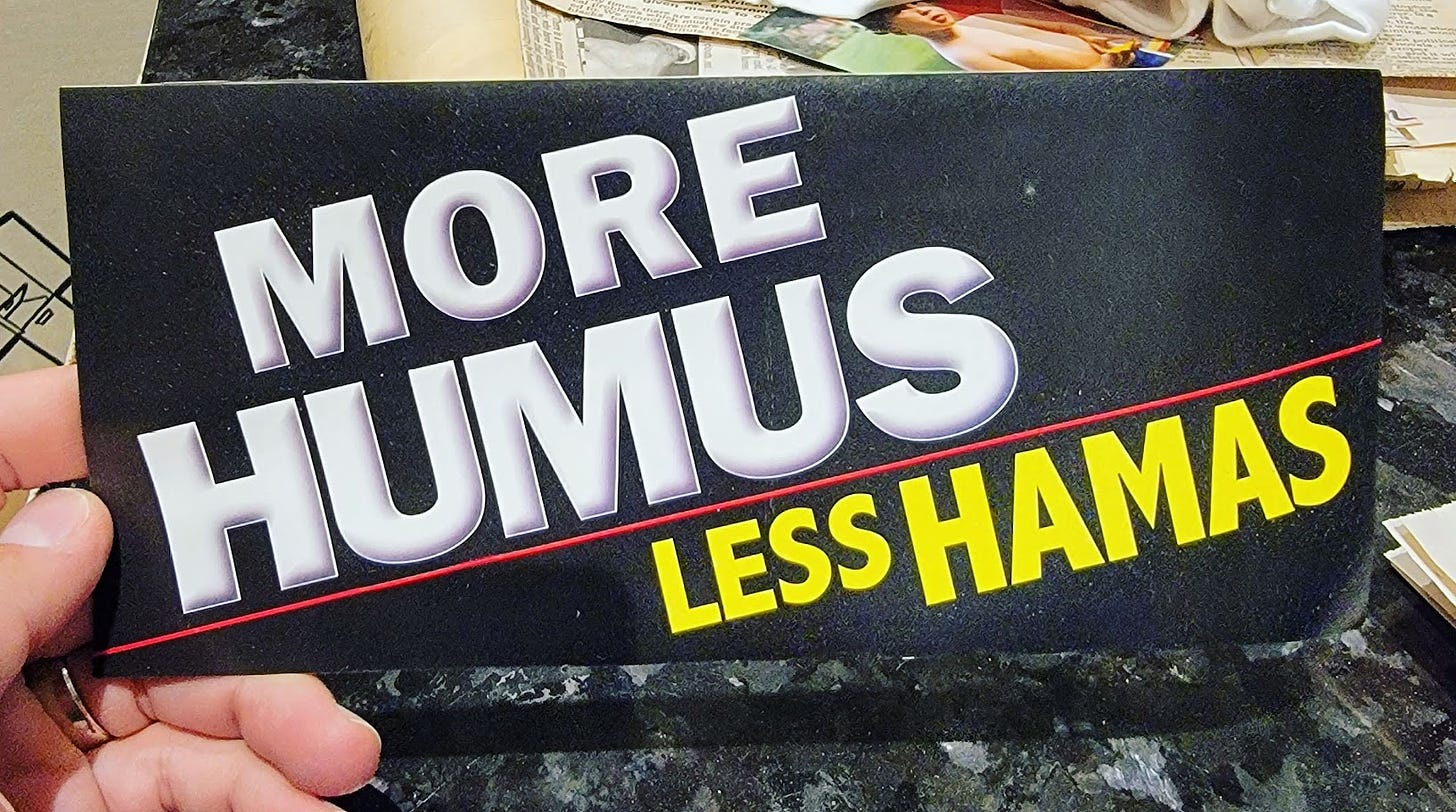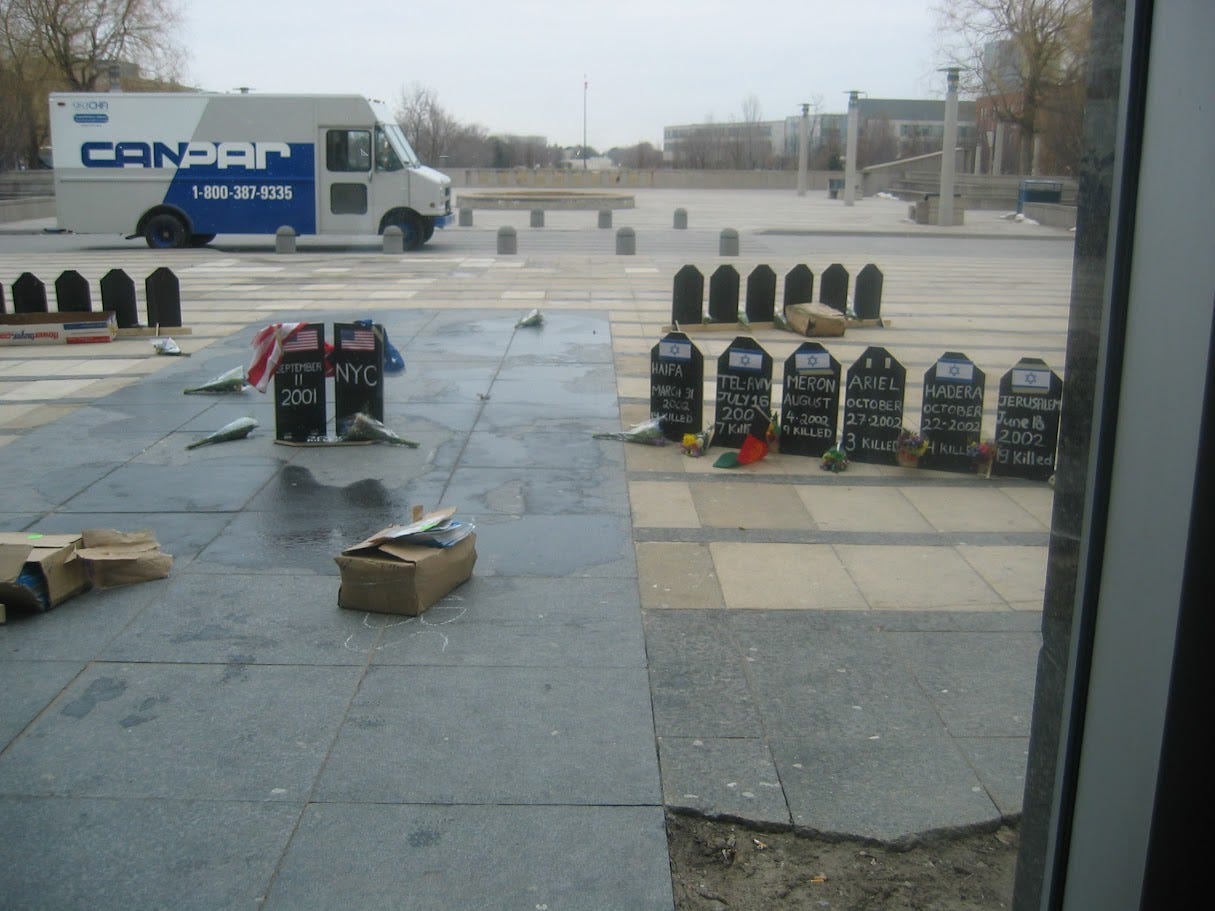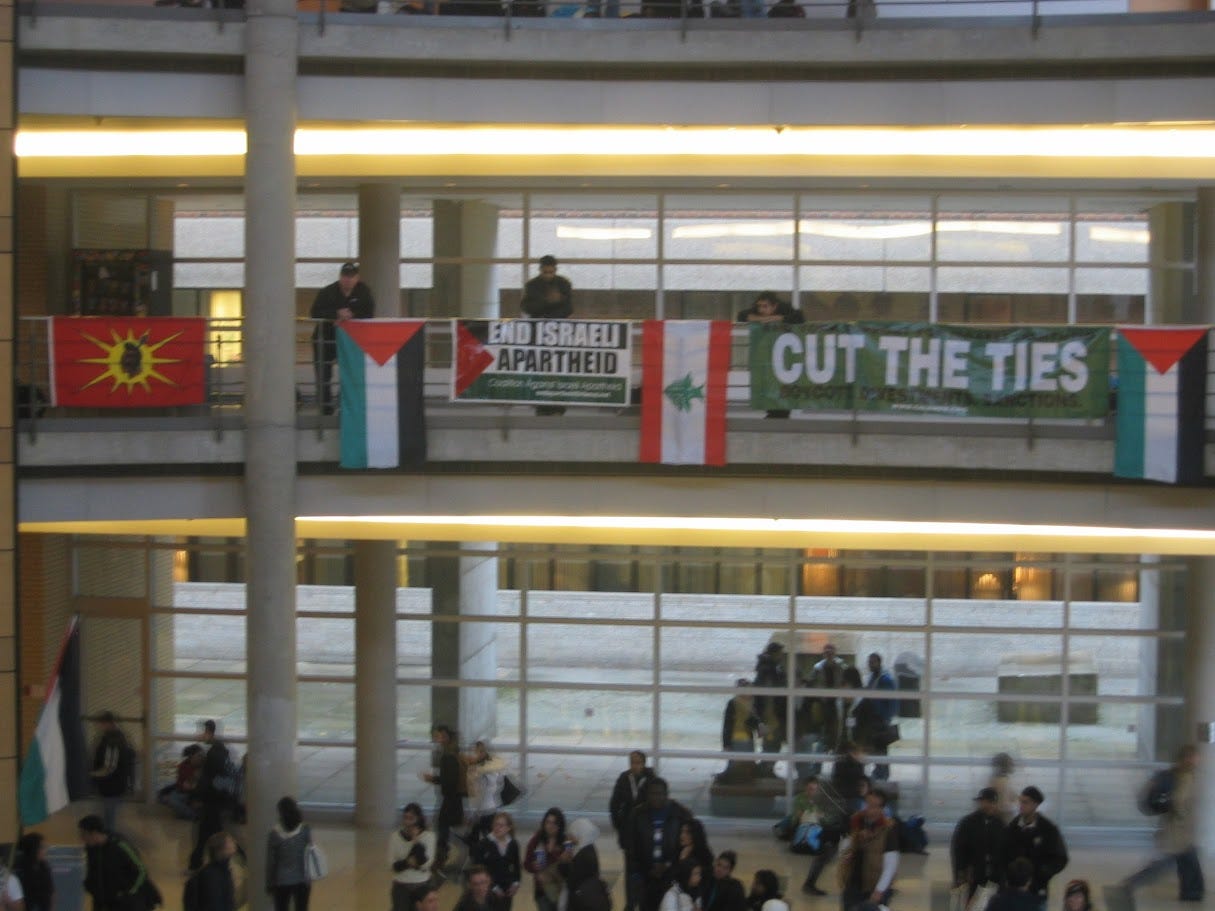Watching the absolute nightmare that is unfolding on campuses across North America these days has made me think about my time on campus many years ago. Those experiences helped shape who I became, and gave me important perspective on the world at a critical time in my life.
At the same time, the animosity I experienced on campus, which was then, at least, significant, seems quaint compared to 2024 campus antisemitism.
Transition to higher education
In 2003, I graduated from the Community Hebrew Academy of Toronto (CHAT). Never too keen to go away for university, I enrolled at York University in Toronto, beginning in September 2003.
My first few months of higher education were painfully uneventful. Then-majoring in psychology (I’d later change to poli-sci and history), I was enrolled in just four courses, down from the 11 classes I’d been taking in my last high-school semester.
I had more time on my hands than I was used to. At a certain point, probably frustrated with my being in the house all the time, my dad suggested that I go and see what was happening at the campus Hillel.
Now, I had admittedly been wholly disinterested in getting involved in Jewish campus life at York. I had just graduated from CHAT, and had spent my life immersed in a Jewish bubble. I wanted a break from Jewish life and wanted to pursue other interests and opportunities. But, my dad insisted, and I respected.
Walking into Hillel
I recall walking into the Hillel lounge on the 4th floor of the Student Centre. I had seen an advertisement for a lecture by some visiting Israeli professor about the partnership between religion and science. I don’t remember much about the lecture, but I do remember meeting some of the Hillel staff that day. They immediately approached and spoke with me, asking what I was interested in. They made me feel welcome and asked what could bring me back. I didn’t know - I hadn’t really thought of it.
At the time, even after 12 years in the Jewish day school system, I only knew the basics about Israel. I didn’t know how to advocate for Israel, and had no idea what the campus environment even was when it came the Arab-Israeli conflict. I didn’t know what school clubs did, I already had a core group of friends, and so I just wasn’t sure what I was looking for, if anything. But I did have an open mind, and was eager to learn something new.
More Humus, Less Hamas
This was, however, 2003, and we were several years into the Second Intifada. With bombs going off far too regularly on Israel’s streets and buses, someone started a petition to have the UN declare suicide bombs (or homicide bombs, as we called them), crimes against humanity. A campus campaign had been started: More Humus, Less Hamas (in hindsight, a campaign that did not work too well).
The campaign consisted of students making their way through campus with trays of pita and humus. Sign the petition calling to make homicide bombs a crime against humanity, and get a snack. The task seemed easy enough, and there was sure to be some free pita and humus in it for me. I signed up to help.
Obviously, the campaign itself was an utter failure, but it did succeed in getting me involved in Jewish campus life.
Norman Finkelstein
That first bout of activism did not expose me to much animosity on campus. Maybe I was only seeking out friends or friendly corners on campus to hawk my humus, but I don’t recall encountering anything then that made me nervous.
The first thing that made me uncomfortable on campus however, when it did come, hit me like a ton of bricks. That would be a Norman Finkelstein lecture I attended in November 2003.
At the time, I had no clue who Finkelstein was. All I knew was that he was a Jewish professor at DePaul University in Chicago, had parents who were Holocaust survivors, that he had written a book about the “Holocaust industry” (basically saying that Jewish organizations monetized Holocaust remembrance), and that he was Alan Dershowitz’s arch-nemesis. He was terribly critical of Israel and the Jewish community, which led to him being invited to speak on campus by anti-Israel student groups. Little has changed.
The Israel Affairs Committee (IAC) that I had recently joined through Hillel had procured several tickets to his upcoming lecture. Their plan was to arrive early, occupy some front-row seats, and then, as soon as he got up to speak, get up and walk out in protest.
Given that I was friendly with the Hillel director, I asked if, rather than walking out, she could stay in the event with me (albeit, sitting in the back and not the front), so that I could hear the lecture. She agreed. She thought it would be a good way for me to learn about the new world I had just entered.
The lecture began, and the Hillel students got up and walked out. Unfazed, the organizer immediately shot up and asked the crowded lecture hall, “Before we begin, are there any other Zionists in the room?”
I was sitting with the Hillel director, and a man behind us knew who she was. He stood up on his seat, pointing down at us and shouting, “Here’s a Jew! Here’s a Zionist!” People turned around and immediately began to shout at us, calling us fucking Zionists and baby killers. What happened next I just don’t recall, but we stayed for the rest of the lecture. I was really impressed by the director’s fortitude. This episode was seared into my memory. It’s what I now think of as my welcome to York.
Rather than deter me from the world of Jewish campus advocacy however, this event encouraged me to do more. I was stunned at the brazenness of the antisemitism and anti-Israel sentiment. With what little I knew at the time about Israel, I wanted to make sure that our pro-Israel side was never drowned out by the volume of the other side’s hate.
Demonstration against checkpoints
The next event I participated in was a response to an anti-Israel demonstration against West Bank checkpoints. Trying to make the point that the security barrier (then under construction) and checkpoints saved lives, Hillel had shirts printed that said “If I was a suicide bomber, you’d be dead by now.” I got to campus early that morning, and helped draw chalk outlines of dead bodies throughout campus, writing the names of terror victims and their dates of death inside the outlines. We prepared tombstones with the dates of various Islamist terrorist attacks, and put them up outside Vari Hall. Things got wild.
The next year, I became the co-chair of the IAC. The year after, I ran for and was elected the President of Hillel at York. I had that role for two consecutive years.
Being involved on campus as a Jewish student was, for lack of a better word, interesting, but it is not an overstatement to say that this involvement changed my life.
A Jew on Campus
At times, my involvement was meaningful. I learned a lot, met new people every day, and was able to help Jewish students connect meaningfully to their religion, their community, and Israel. Coming from day school, I had taken for granted what Jews knew about their own heritage, and it was special helping those who did not, foster greater ties.
At times, it was empowering. I was given a platform to speak and have my voice heard for the first time. I was interviewed by the media (including a SUPER awkward interview after Arafat had apparently died and then was reported to not actually have died), and had access to campus officials. I was given interesting engagement opportunities which made my time on campus memorable and enjoyable. It also prepared me for the real world.
Given my role with Hillel, I also tried my best to understand the other side of the Israel-Palestinian conflict, and I made real efforts to get to know, personally, some of the activists on the other side of the regular campus protests. I’d go so far as to say that some of us even became friends, if not publicly, at least privately. In that capacity, we spoke candidly and learned from each other.
Many times, my involvement was complicated. It was not easy then, and it is certainly not easy today, being openly Jewish and Zionist on campus. I was plunged into the depths of the Israel-Palestine debate on campus, had my comments taken out of context in the campus newspaper, and my intentions distorted daily. I was told one day that it was inappropriate for me to organize a Holocaust remembrance event on campus, because I, Adam Hummel, am directly to blame for the Palestinian genocide, and was held personally responsible for the Sabra and Shatila massacres (that pre-dated my birth by three years). It was tough, but it certainly helped foster a resilience that I needed.
While I was confident that I was not personally responsible for any massacres, at the same time, my understanding of events on the ground in Israel and the Palestinian Territories were challenged. I was only 18 when I got to campus, and had a lot to learn. That is, in fact, what university is supposed to be about. I wanted to learn about the Palestinian and anti-Israel narratives, and understand where their grievances originated. I was encouraged by Hillel staff members and other students to speak frankly to those on the other side. In fits of anger, if I made comments about their lies, I was reminded that though there are certainly many fabrications in the other side’s narrative, that it is still a narrative with real emotions, and that it was important to learn, to weed out fact from fiction, and understand how both sides got to where they are today.
I attended their events, and they attended mine. Their attendances at my events were marked with disruption, chants, chair-throwing, and efforts to shut speakers down. My attendance at their events were far more polite. I even took notes.
Sometimes, my involvement was horrifying. Openly vilified by many who called themselves my opponents, I was sometimes threatened with violence, followed to my car in the evenings, or told that I was being watched. This was for nothing other than being a Zionist and Jew on campus. Anyone who knows me knows that I am neither a controversial nor radical person, and I pride myself in meaningful involvement. Finding myself in the middle of an impassioned rally in Vari Hall, at the centre of the university, with a “Apartheid wall” on one side, with Jews dancing the hora on the other side, was a difficult position to be in, and there were concerns for everyone’s safety and security. One person’s stupid move could set off a wave of violence.
Stop the Hate Campaign
In fourth year, with the 2006 War in Lebanon recently resolved, tensions on campus were flaring. In response, the York Federation of Students (YFS) organized a “Stop the Hate” week, to target all forms of hatred, including “Racism, Islamophobia, Antisemitism, and Colonialism,” among other things.
At the launch of the “Stop the Hate” campaign in the Student Centre one day, I made brief remarks, as the President of Hillel, about what we would be doing to help bring awareness and teach about antisemitism on campus. I had even bought a fun shirt for the launch that said “Pro-Semite” across the chest. My remarks were terribly milquetoast.
After I stepped off the stage, the next speaker was the representative of the Arab Student Collective. He began his remarks - again, at a “Stop the Hate” campaign launch - with, “Do you smell that? It is the smell of sulfur, as the devil was just here, speaking immediately before me.”
That’s me, the devil.
I thus naturally turned red, seething with anger at the President of the YFS for allowing him to continue to speak. Surely she realized how preposterous it was to launch a campaign against hate by allowing someone like this to speak. She defended him however, as “he had the right to say what he wanted”, and the entire campaign fell apart before it could even get started.
Hezbollah
That year, I also took Introduction to Arabic. On the first day of class, we went around the class to introduce ourselves and explain why we wanted to learn Arabic. I introduced myself (I was known to many students in the class as the Pres of Hillel), and said that I was interested in learning Arabic so that I could broaden my horizons, and maybe use it to read Arabic newspapers, and better understand a different perspective.
A few minutes later, a classmate told everyone that he wanted to learn Arabic so that he could join Hezbollah, and maybe deal with Zionists, “like my friend over there.” He pointed to me. The professor (a Christian-Israeli-Arab) smirked because she thought he was joking. When she realized he wasn’t, she was horrified. The rest of the class sat silent.
I saw a student affiliated with the YFS wearing a Hezbollah tshirt on campus one day. I went to the YFS president to complain. She told me that there was nothing wrong with the shirt, as Hezbollah was “a secular social services resistance organization in Lebanon.” I told her that Hezbollah literally meant "Party of God” (my Arabic classes were already paying off), was a terror organization, and was hardly secular. She didn’t care about my outrage, or about her stupidity. I complained to the Ombudsman of the university about the tshirt too. I was told something about freedom of speech.
Life after campus
About a year after graduating, I returned to campus for a brief meeting for something totally unrelated to campus politics. I bumped into and was chatting with an anti-Israel activist, Natasha, with whom I had become friendly over the last few years. As we were speaking at the bottom of the stairs in the packed Student Centre at lunch time, the then-President of the YFS walked past and glanced at us. He walked up one flight of stairs, turned around, and at the top of his lungs shouted down to us, “Natasha, what are you doing talking to that fucking Zionist?!?”
That nickname really seemed to bookend my time as a Jew on campus.
It’s funny, because my speaking up as a Zionist Jew on campus - not in any particularly controversial way mind you - followed me later in life too.
Articling
Five years after I graduated, and after completing law school, I was articling at a Bay Street law firm. One of the associates with whom I was working was assisting someone running at the time to be a leader of the National Democratic Party (NDP). He would be assisting her during the leadership convention in Toronto, and wanted me to be there with him to assist with research. The NDP is obviously not my party, but when you’re articling, you do as you’re told.
The associate applied for a security pass for me to enter the convention. The next day he came back and told me that he could not use my help anymore. Relieved to not be helping the NDP in any way, I asked what happened. He told me that my request for a security pass had been blocked because of my activism with Hillel on campus.
“You know that is full blown antisemitism, right?” I said. He said he knew, but that there was little he could do. He asked what I did on campus that would have followed me all these years later, that made me known to authorities at the NDP leadership convention. I told him that I was an active Jew on campus, and that those in power would have preferred me to be quiet.
The next day, I asked him if his knowing that this is what the NDP thinks about Jews would make him think differently about the party. I don’t recall getting an answer, and am not sure what has happened since.
Campus today
I think about all this, and how my experience on campus then changed my life, entirely for the better. After graduating from undergrad, I worked for a year as the Education Officer at the Union of Jewish Students of Great Britain and Ireland. I was also the President of the Jewish Students Association (JSA) at the University of Windsor, while in law school.
The nastiness I experienced from the anti-Israel crew at York, in Windsor, and in the UK, pushed me to learn more about Israel and Zionism, and to advocate for our cause. But it never actually made me feel threatened - for my life or my academic success - on campus. I should also be clear: I absolutely loved my time on campus.
Though I recall one of my TAs at York once making a comment about the Rwandan Genocide being worse than that Holocaust (which was I think more ignorant than offensive), I really don’t recall any of my professors saying anything overtly antisemitic or anti-Israel in class. And I majored in political science. I never heard about oppression or white privilege or colonialism. I was never told in class that Israel was a White colonialist oppressor state, was never made to feel different because I was a Zionist (at least by any faculty members), and I was certainly never told to go back to anywhere. But this was all about 18 years ago.
Having watched the campus protests unfold in the United States, and some in Canada, over the last few weeks, my experiences seem almost quaint. At university, being an overt Zionist didn’t smack me in the face - literally or figuratively - as it does so many students today. I could handle underhanded comments and students in keffiyehs, but the utter insanity that is campus today, the outright antisemitism, the effort to make Jewish students feel unsafe, the ability of students to actually talk about harming or killing Jewish students, the willingness of faculty members to pile on with the mob, and the effort by traitorous anti-Zionist Jews to get into bed with our enemies, is far more pronounced today than ever before.
This is also not to mention that I went to university pre-social media.
I was on campus before Hamas took over Gaza. I was on campus when Israel disengaged from Gaza in 2005. I recall feeling hopeful that such a move would empower the Palestinian Authority to take control of its people and territory, and show that it was ready for self-rule. How naive I was. That plan backfired quickly. Hamas, the Palestinian Authority, and Hezbollah, all made clear that Gaza was not enough. It wouldn’t be a state: it would be a launching ground for terrorism. They wanted the entirety of Israel too. They started digging tunnels.
Back then, I was once watching an anti-Israel lecture on campus when someone in a keffiyeh put their hand up and observed that Mahmoud Abbas and Ariel Sharon had agreed to something at some conference, and that maybe peace would be achievable in the near future. That person was booed out of the room for daring to suggest that peace was possible. The anti-Israel activists did not then, nor do they now, care for the well-being of the Palestinians, who could certainly benefit from peace. They only care about the demonization, double-standard-ization, and delegitimization of Israel.
I cannot fathom what being on campus today is like. I am blown away, daily, by the bravery of those Jews who stand up for themselves and their community in the face of a very real risk of violence. By speaking out as Jews and Zionists, they risk not only their physical safety but also their academic success, which can easily be tainted by a professor who refuses to read a paper about the merits of Israel or Zionism, or give a decent grade to someone who argues against the woke, illiberal zeitgeist, or even someone who the professor knows is Jewish/Zionist.
Today’s Jewish and Zionist students, and their allies on campus, deserve all the respect and support in the world. They are on campus primarily to get an education. In doing so, they have been thrust into a world of illiberalism, of terror-sympathizers, of frankly a world turned upside down. Whether they have sought out a fight on behalf of their principles, or have been thrust into that fight by virtue of nothing other than their Jew-ish last name, they need all the support they can get.
They are on the front lines of a battle for society’s future, and must be equipped for what comes next. To borrow a phrase, they are fucking spectacular Zionists.










Such a powerful piece, Adam.
We must continue to stand up against all of this hatred.
Very insightful, Adam! Keep on keeping on!